|
In this world of artificial connection, can we still discover and grasp an authentic connection within ourselves to our Triune God? Many of us are technologically connected throughout the day and into the evening, whether it be through social media, texting, e-mails, the Internet, or general screen time. In a normal day-to-day setting, take a moment to reflect on how often you have face-to-face time to truly speak with and connect with your family, peers, friends, or co-workers. In those moments, are you able to reach beyond a superficial level of connection? Oftentimes amidst the busyness of our lives, schedules, commutes, and responsibilities, we find it difficult to truly maintain a connected relationship with others that goes beyond our phone, tablet, or computer screen. If maintaining this human connection has become difficult, how much more difficult is it for us to find those moments of quiet, internal spiritual connection to God? Our society and technology have fooled us into believing that all of this quick and easy access has made it easier than ever to keep in touch with those that mean the most to us. And yet oftentimes it has instead succeeded in building walls of electronic screens not only between us and others but, more importantly, between us and God. There are many things that resonate between our physical, or exterior, and our spiritual, or interior, lives. What is the equivalent “screen time” in our spiritual lives? Where are we holding onto surface-level connections instead of digging deeper into our relationship with God and growing in our spiritual life? Are we holding onto a barrier that is holding us back from maturing in our spiritual development? Just as we grow, develop, and mature in our physical lives, we are called to do so in our spiritual lives as well. Today, we celebrate and commemorate the life of Saint Teresa of Jesus, also known as Saint Teresa of Avila. Saint Teresa was a spiritual writer and mystic. She is one of four females to be named a Doctor of the Church, meaning that her spiritual writings have been given special authority. Her teachings, writings, and life can point us in the direction of growing in our interior life and thus growing in our faith and connection to God. In Saint Teresa’s spiritual writing The Interior Castle, she likens the stages of growth and development of our interior life to seven mansions within a castle. Saint Teresa describes the dwelling of God within us as residing in the seventh mansion of our castle. Through the growth and development of our spiritual life, our soul is to journey through the mansions to find its rest within the seventh, the kingdom of God. The first step in entering the castle is prayer. Saint Teresa teaches that, “Souls without prayer are like people whose bodies and limbs are paralyzed.” Let’s take a moment to reflect on our prayer life. Are there any “electronic screens” standing in the way of deepening our relationship and our conversations with our Creator? Are we connecting to God in our prayer life as if we are updating our Facebook status or posting our latest photo to Instagram? Or are we really striving to power down the screens of distraction in our life to speak with God AND listen to Him? Let us turn to the life of Saint Teresa as an example and inspiration for our desire to develop the maturity of our soul. The next time you enter into prayer, “Go to your inner room, close the door, and pray to your Father in secret.” (Matthew 6:6) If we look at these words of Scripture through the lens of Saint Teresa’s teachings, we must pass the walls of our castle, our body, in order to enter our inner room. Allow yourself a few moments to quiet and calm the body in order to turn your focus to God. Take time to power down the screen. Close your eyes and breathe deeply. The Divine Physician has created our body in such a way that by slowing and deepening our breath rate, our heart rate and blood pressure decreases, our muscles relax, and the racing thoughts of our mind slow so that we can focus on one Triune thing, our God. In this state of quiet and calm, invite the Holy Spirit into this moment and seek a true, contemplative connection in prayer with your Creator. I would like to close with a prayer often attributed to Saint Teresa of Avila: “May today there be peace within. May you trust God that you are exactly where you are meant to be. May you not forget the infinite possibilities that are born of faith. May you use those gifts that you have received, and pass on the love that has been given to you. May you be content knowing you are a child of God. Let this presence settle into your bones, and allow your soul the freedom to sing, dance, praise and love. It is there for each and every one of us.” Saint Teresa of Avila, pray for us!
0 Comments
We live in a world where social media creates a narrative of perfection and curated happiness. The constant pursuit of success, fulfillment and precision fuel our actions. We confuse modern ideals of self-interest, pleasure and minimalism with happiness. This false sense of happiness leads to a severe sense of discontent with our culture of appearances and deception. This, in turn, gives rise to the importance placed on truth and authenticity. Beneath the discontent we all feel is a shared desire to witness and live authentic lives. In a new film, “Pope Francis – A Man of His Word,” we watch the story of a man who practices what he preaches. In the movie, we hear from a religious sister who says that God gives us a pope who is a reflection of what we need in the current times. In a global society that is starved for genuineness, sincerity and truth, Pope Francis provides the world with simple, bite-sized snippets of profound wisdom that are easily understood. In one of those snippets of wisdom, our pope urges us to “Talk little, listen a lot.” As 1 John 3:18 says, “Children, let us love not in word or speech but in deed and truth.” Pope Francis shows us through his actions – washing the feet of inmates, providing a kind touch of prayer to sick children – that tenderness is strength and not weakness. I work in communications and in my profession we have a common phrase that says, “show, don’t tell.” Our culture yearns to see others living out honest, genuine values through action, not words. Pope Francis is an example of someone who shows us how to love and that love is a choice. Love is at the core of Jesus’ message. His teachings are those of love in action. Jesus tells us in Matthew 22:37-40 that the greatest commandments are to “love the Lord, your God, with all your heart, with all your soul, and with all your mind … You shall love your neighbor as yourself. The whole law and the prophets depend on these two commandments.” However, in order for us to love like Jesus, we must be free to give of ourselves to another. Freedom isn’t the ability to do whatever we want, when we want, where we want; it’s the ability to choose what is noble, true and right. Sometimes it seems that as a society we have lost our identities as free beings created by God to love and be loved. We forget that God placed the sense of longing for happiness in our hearts so that we may love him, ourselves and others. This yearning is designed to bring us closer to God and ultimately provides our fulfillment. Questions for Reflection: Who are the people in your life that show you how to freely love others? How can you show love for others in your own way using the gifts bestowed upon you by the Holy Spirit? What are some simple steps you can take to live out your life authentically? Giving and gaining. These two words sum up my experience interning at the Catholic Apostolate Center. Over the course of the last four months, I feel like I have helped in assisting the advancement of St. Vincent Pallotti’s mission as expressed in the 21st century through the work of the Center. In return, I have gained a significant amount of experience that I intend to use in my future endeavors as a young Catholic engaged in social media. The Center’s goals are aimed towards forming Catholics who embrace the style of evangelization that Pope Francis has coined as “missionary discipleship,” and before him, what St. Vincent Pallotti called the “Universal Apostolate.” After several weeks of working with this team, I can safely say that I, too, have been impacted by the central message of the organization. Each week in passing, I became more confident in the idea that I am a missionary disciple.
To be more precise, I would like to address exactly how I’ve grown by participating in the Center’s mission. As a young Catholic already involved in social media evangelization, having worked on a small blog of my own creation, it was a true blessing for me to be offered the opportunity to work on a grander project in a more professional environment. I am aware of several peers of mine, both in college and high school, who work on their own amateur Catholic media projects, and I urge them to take interest in the Center’s goals and aims. Working for the Center is an opportunity that shouldn’t be passed up. The vast amount of resources offered to expand a person’s knowledge of Catholic social media is astounding. The Center is growing, meaning that there is an air of personality and friendliness to it, yet it manages to retain the utmost amount of professionalism by hosting conferences, inviting fantastic speakers on webinars, and using advanced hardware and software that impressed me on my first day. Because of this combination of expertise and community, I felt myself develop not only as a professional evangelizer, but also as a young man in faith. What have I given to the Catholic Apostolate Center? Certainly, time and dedication, though this is mostly thanks to the staff’s magnificent ability to ferment enthusiasm and foster talent. The managers I worked with were splendidly approachable and allowed me to grow at my own pace. In return, I gave as much as I could—via web design, video editing, and as a production assistant. Some days I redesigned pages of the website. Other days I was given videos to piece together using Adobe Premier Pro. Generally speaking, I feel satisfied with the level of involvement I had with the Center. It is a great entry-level internship for students who are busy; the Center is understanding and flexible for scheduling. Essentially, the warm and energetic environment of the Center helped to kindle my ambition and interest in exploring social media evangelization, and I believe that is the reason I was able to work so efficiently on tasks delegated to me. What have I gained from my experience with the Catholic Apostolate Center? I have learned a variety of skills and techniques in media production that are difficult for any young person to find without spending copious amounts of money. Walking into the office the first day, I knew I was in a professional studio. The Center is resourceful and efficient, making creative use out of all its equipment and space. Since the team is still expanding, it felt great to know I was contributing to the growth of an organization. These are experiences that not only apply to Catholics interested in evangelization, but also to young men and women interested in small businesses, marketing, and communications. I am happy to have been a part of such an ambitious project, and I am looking forward to seeing how the Center finds ways to continue thriving. Working at the Catholic Apostolate Center has given me greater insight into the world of professional Catholic media, while also empowering my faith. At the same time, I would recommend this internship opportunity to anyone, regardless of faith, who is interested in the mechanics of production. This really is a once-in-a-lifetime experience that I cannot praise enough. Thank you to the staff for giving me the chance to serve alongside you all on our collective quest to become missionary disciples. William Deatherage is a student of Politics and Theology at The Catholic University of America. He interned with the Catholic Apostolate Center from January 2018 to May 2018. Today we celebrate the fifth anniversary of Pope Francis’ pontificate. In these short years, Pope Francis has done much to continue the work of his predecessors in building a culture of evangelization and inviting each member of the Church to live out their baptismal call as missionary disciples. Several important Church documents have been released throughout his papacy, including Evangelii Gaudium, the Apostolic Exhortation on the Proclamation of the Gospel in Today’s World, Laudato Si’, the encyclical on Care for our Common Home, and Amoris Laetitia, a post-synodal Apostolic Exhortation on Love in the Family. Pope Francis has participated in two World Youth Days, made roughly 22 international apostolic visits, and has canonized 885 saints. He called for the Jubilee Year of Mercy from 2015-2016. I would like to celebrate the fifth anniversary of his election by sharing some quotes that characterize his papacy and capture its tone.
1. A Church on Mission "I prefer a Church which is bruised, hurting and dirty because it has been out on the streets, rather than a Church which is unhealthy from being confined and from clinging to its own security… More than by fear of going astray, my hope is that we will be moved by the fear of remaining shut up within structures which give us a false sense of security, within rules which make us harsh judges, within habits which make us feel safe, while at our door people are starving. -Evangelii Gaudium, 49 Pope Francis envisions a missionary church—one with open doors to welcome people in, but also for each of us to step out and bring the Good News of Jesus Christ to the world. As Christians, it can be tempting to remain within the safety of our parish and Church community. However, Jesus calls us to “go out to the nations” and encounter the hurting world. Pope Francis reminds us of this evangelizing spirit entrusted to us by Jesus Christ and challenges us to be a Church on mission. 2. The Inherent Dignity of Mankind and Creation “Our insistence that each human being is an image of God should not make us overlook the fact that each creature has its own purpose. None is superfluous. The entire material universe speaks of God’s love, his boundless affection for us. Soil, water, mountains: everything is, as it were, a caress of God.” -Laudato Si, 84 About two years into his papacy, Pope Francis released his encyclical Laudato Si’, focusing on our responsibility as stewards of creation. No other pope has dedicated an entire encyclical to the care of creation. In doing so, Pope Francis reminds us that all of the created world helps us to glimpse and better know God Himself. Mankind is the pinnacle of creation, made in God’s image and likeness. In Laudato Si’, Pope Francis reminds us of each person’s inherent dignity, made with his or her own purpose, gifts, and mission. 3. The Transformative Power of Christ’s Love “Jesus’ love goes before us, his look anticipates our needs. He can see beyond appearances, beyond sin, beyond failures and unworthiness…He sees beyond this, to our dignity as sons and daughters, a dignity at times sullied by sin, but one which endures in the depth of our soul. He came precisely to seek out all those who feel unworthy of God, unworthy of others.” – Homily at Plaza de la Revolución during his Apostolic Journey to Cuba At the heart of the Christian life is an encounter with Jesus Christ. His love is transformative, life-changing. We encounter Christ in prayer, the sacraments, the parish, in one another. However, we cannot overestimate the importance of our prayer life—of moments throughout each day in which we enter into dialogue with God, offer up our work and sacrifices, remember the needs of others, or give God praise. When we carve out time each day for prayer, we are better able to know the look of Christ that goes beyond the worldly way of seeing things into our dignity as sons and daughters of God. 4. The Role of the Church in the Christian Life "We cannot understand Christ without his Church, just as we cannot understand the Church without her spouse, Christ Jesus, who gave his life out of love, and who makes us see that it is worth the price.” -Prayer Vigil for the Festival of Families in Philadelphia I love this quote because it sums up the relationship between Christ and His Church. We cannot know Christ apart from the Church, just as the Church cannot exist without Christ. Christ founded the Church in order to be a place of encounter with Him through the sacraments and through one another. We come to more fully know the love of God in the life of each parish. How can we create communities of encounter in our various parishes? Is the light of Christ truly shining forth in our communities? 5. The Messiness and Joy of Family Life “I thank God that many families, which are far from considering themselves perfect, live in love, fulfill their calling and keep moving forward, even if they fall many times along the way. The Synod’s reflections show us that there is no stereotype of the ideal family, but rather a challenging mosaic made up of many different realities, with all their joys, hopes and problems.” -Amoris Laetitia, 57 Pope Francis speaks realistically of human life and love. The family, the domestic church, is not perfect. We are called to learn and grow in love throughout our entire lives, just as we are called to learn and grow in holiness. The family is the place where love is mastered and refined. It is the foundation of society and of the Church. Pope Francis calls families to journey joyfully on the path of love. He invites us not to fear our imperfection, but to keep moving forward in hope and joy. 6. Not Letting Fear Impact Vocational Discernment “The work of discernment identifies our fears and can then help us to overcome them, opening us to life and helping us to calmly face the challenges that come our way. For us Christians in particular, fear must never have the last word but rather should be an occasion to make an act of faith in God… and in life!” -Message for World Youth Day Panama In preparation for the 2018 Synod on Young People, the Faith and Vocational Discernment and World Youth Day 2019 in Panama, Pope Francis spoke of the process of discernment, especially for young people today. Fear is often at the heart of our actions—or inaction. Christians, however, have no cause for fear. As we discern God’s call for our life each day, let us place our trust in Him and act with courage and boldness. God has created us for a unique mission that only we can fulfill in His Church. Let us discern his will for us, as Pope Francis encourages, “trusting that he will lead us to a good end.” 7. The Importance of Contemplating and Encountering God’s Mercy “We need constantly to contemplate the mystery of mercy. It is a wellspring of joy, serenity, and peace. Our salvation depends on it.” -Misericordiae Vultus, Bull of Indiction for the Extraordinary Jubilee of Mercy Starting in 2015, Pope Francis instituted the first Jubilee Year of Mercy in the Catholic Church. Throughout this time, he invited the Church to contemplate once more the merciful gaze of the Father and experience God’s mercy in our lives. We cannot be merciful without first having personally experienced the mercy of God. I loved that as a Church, we dedicated a year to contemplating this great mystery. We know God as Father, Savior, Creator, Just Judge, and many other titles. But how often to experience His mercy, as evidenced in the parable of the Prodigal Son and in the story of Jesus meeting the Woman at the Well? 8. Our True Identity “That is our real ‘stature,’ our spiritual identity: we are God’s beloved children, always. So you can see that not to accept ourselves, to live glumly, to be negative, means not to recognize our deepest identity…God loves us the way we are, and no sin, fault or mistake of ours makes him change his mind…God counts on you for what you are, not for what you possess…In his eyes, you are precious, and your value is inestimable.” -Homily at World Youth Day Mass in Krakow At World Youth Day in Krakow back in 2016, Pope Francis reminded youth and young adults of an incredible universal truth : that our identity lies in being God’s children. In a world so often focused on our careers, material possessions, prestige, or online presence, Pope Francis gets to the heart of our identity as being completely loved by God. It’s easy to forget that we are loved simply because we exist. We all hold a valuable and irreplaceable space in God’s heart. By being most authentically ourselves, we are better able to fulfill our mission within His kingdom and become the saints He wants us to be. 9. Using Technology and Social Media Wisely “Communication has the power to build bridges, to enable encounter and inclusion, and thus to enrich society…Words can build bridges between individuals and within families, social groups and peoples. This is possible both in the material world and the digital world.” -World Day of Communication 2016 We live in a world saturated by social media, technology, and widespread communication. Used irresponsibly, these can isolate and distract mankind. Pope Francis encourages people today to use technology and social media in order to promote a culture of encounter and accompaniment. He challenges us to be “digital citizens” who are not afraid to use technology to spread the Gospel. 10. Being People “For Others” “Love has no alibi. Whenever we set out to love as Jesus loved, we have to take the Lord as our example; especially when it comes to loving the poor.” -Message for the First World Day of the Poor In 2017, Pope Francis called for the first World Day of the Poor—a day in which we act not only in word, but in deed in order to alleviate poverty and accompany those on the margins of society. Pope Francis encourages the world to give and not to count the cost, to love as God first loved us. In a culture of consumerism, we can easily forget to think about our neighbor or those less fortunate than ourselves. Pope Francis reminds us of the importance of giving freely, drawing near to the poor, embracing them, and being transformed through that process. Click here for free resources on Catholic Social Teaching. Question for Reflection: Do you have a favorite quote from Pope Francis’ papacy that’s not listed above? Share it in the comment section below and let us know why it’s powerful for you. Communicating in an audio format is nothing new. During and after World War I, radio transformed communication in households and across battlefields. Speeches, reporting, and entertainment also utilized this medium for many different audiences and purposes. The Catholic Church has taken advantage of developments in audio communication in order to transmit homilies, catechesis, and words of encouragement for almost a century, the long standing Vatican Radio being one example. Now in the 21st century, a new medium of audio evangelization has formed in the lexicon and zeitgeist: podcasting. A portmanteau for iPod and broadcasting, podcasts are audio files that can be downloaded and listened to. They have reinvigorated the audio sphere for the digital age, with thousands of podcasts and hundreds of hours of content being created every day. What does that mean for Catholics trying to evangelize and move people to mission? How should we as a Church approach new media and new methods of communication?
Many Catholics are trying to answer that question in a variety of ways. During the World Day of Communication in 2014, Pope Francis encouraged the Church to “boldly become citizens of the digital world.” He continued, “The Church needs to be concerned for, and present in, the world of communication, in order to dialogue with people today and to help them encounter Christ.” Over the past year, the Catholic Apostolate Center has created podcasts in an effort to evangelize and help others encounter Christ. We started by recording some of our most popular blog posts for people to listen to “on the go,” and we are now launching a new podcast initiative called “On Mission” to discuss important themes and topics for Catholics today. (Keep an eye on www.catholicapostolatecenter.org/podcasts for the forthcoming launch of this series.) How do we view podcasts as a moment of evangelization? Like any other video, writing, or audio, podcasts enable us to be prophetic witnesses to the faith in a way that’s approachable and encounters people where they are. I think that if we approach podcasts as Archbishop Fulton Sheen approached television over 50 years ago, we will be responding to Christ’s command to “go out to all the nations” and evangelize. Archbishop Sheen used a new medium of communication for the glory of God. Today, podcasts are just one tool we can use in order to more effectively spread the Gospel message. In many ways, Pope Francis is calling all people to engage in this sort of witness of the faith by utilizing the means of communication at their disposal. During the World Day of Communication in 2014, he remarked on the importance of using media to inspire moments of encounter and to increase solidarity. He said, “In a world like this, media can help us to feel closer to one another, creating a sense of the unity of the human family which can in turn inspire solidarity and serious efforts to ensure a more dignified life for all. Good communication helps us to grow closer, to know one another better, and ultimately, to grow in unity.” At the Catholic Apostolate Center, we aim to use the various means of communication at our disposal for that very purpose: to create a sense of unity within the Church and also in the world. How beautiful would it be if all members of the Body of Christ were to be this peaceful and harmonious? It is my belief that we can, as was done with radio or television, offer this sort of peaceful accompaniment to another generation of evangelizers. I would like to conclude with a prayer written by Pope Francis that was inspired by the prayer of peace attributed to St. Francis: “Lord, make us instruments of your peace. Help us to recognize the evil latent in a communication that does not build communion. Help us to remove the venom from our judgements. Help us to speak about others as our brothers and sisters. You are faithful and trustworthy; may our words be seeds of goodness for the world: where there is shouting, let us practice listening; where there is confusion, let us inspire harmony; where there is ambiguity, let us bring clarity; where there is exclusion, let us offer solidarity; where there is sensationalism, let us use sobriety; where there is superficiality, let us raise real questions; where there is prejudice, let us awaken trust; where there is hostility, let us bring respect; where there is falsehood, let us bring truth. Amen.” Questions for Reflection: What are some examples you’ve seen of using media positively in order to build communion? Can you think of others in which media or technology created isolation? How is God calling you to use the tools at your disposal in order to share the Gospel? To listen and subscribe to our latest podcasts, please click here. "Remember that the Christian life is one of action; not of speech and daydreams. Let there be few words and many deeds, and let them be done well." – St. Vincent Pallotti Blessings to all as we prepare to celebrate the feast of St. Vincent Pallotti on January 22nd! Some may ask, “Who is that?” I am glad that you asked. St. Vincent Pallotti and his charism are the reason why the Catholic Apostolate Center exists. He was a priest of the Diocese of Rome in the first half of the nineteenth century. His ministry spanned the poor to popes. It did not matter what a person was, but who the person was, an image and likeness of God, the Infinite Love. He saw all people as gifted by God with talents that were meant to be shared. On January 9, 1835, St. Vincent Pallotti was inspired to found the Union of Catholic Apostolate, a collaborative association of lay people, religious, and clergy, who were called to assist in the missionary efforts of the Church through all apostolic methods and means, “revive, maintain, and increase the faith” of Catholics, and be an “institution of universal charity”. Over time, a community of priests and brothers and communities of sisters developed as well. Members of the Union of Catholic Apostolate are now in over 50 countries around the world. The Catholic Apostolate Center, a ministry of Pallotti’s community of priests and brothers, is a 21st century expression of his charism that works to revive faith, rekindle charity, and form apostles. Looking the other way when others were in need was not possible for Pallotti and his life calls all, particularly Catholics, to be more than simply passive participants in the Faith. Instead, we are called to be apostles, sent by Jesus Christ out into the world to spread the Gospel and charitably bring healing and consolation in the midst of brokenness and suffering. The most vulnerable and in need were closest to the heart of St. Vincent Pallotti as he and his companions went into the streets of Rome to care for them day after day and night after night. On January 22, 1850, he died from a respiratory illness because he had braved the elements to continue his work after giving away his cloak to a poor elderly woman on a cold, rainy night. St. Vincent Pallotti understood well what Pope Francis teaches us today: “Jesus, the evangelizer par excellence and the Gospel in person, identifies especially with the little ones (cf. Mt 25:40). This reminds us Christians that we are called to care for the vulnerable of the earth” (Evangelii Gaudium, n. 209) We invite you to learn more about St. Vincent by downloading our Pallotti App or visiting our Pallotti Portal. May the Charity of Christ urge us on!
Today we celebrate the sixth anniversary of the Catholic Apostolate Center. In these six years, we have been to countless conferences; developed relationships with numerous national organizations and dioceses; shared thousands of saint images on Facebook; emailed hundreds of newsletters; and collaborated with bishops, priests, religious, diocesan officials, lay ministers, and Catholic leaders from around the world. In these six years, we have appreciated the collaboration with each and every one of you and look forward to continued development of programs and resources to revive faith, rekindle charity, and form apostles.
In celebration of this anniversary, we invite you to view our updated introduction video of the Center. This video highlights the mission of the Center and our constant desire to live as missionary disciples. Please be assured of our prayers for you through the intercession of Mary, Queen of Apostles and St. Vincent Pallotti, patron saints of the Catholic Apostolate Center. May the Charity of Chris urge us on! Preparing for Hurricane Irma has given me a fresh perspective on what matters most. With each alert, evacuation notice, and email telling me that work would be canceled for “x” amount of days, my panic level rose. The uncertainty of the storm’s path falling on my city and then my family’s city kept us all in constant contact reviewing our emergency plans. Social media messages from friend to friend with notes of encouragement and “hurricane hacks” brought us all closer together around the state. Thankfully, I am located in north central Florida, where Hurricane Irma caused less damage than its two landfalls near Naples and The Keys. Prepping my house and selecting the most important items to protect for survival is very humbling. While packing, I thought of my fellow Floridians who evacuated south Florida not knowing if they will have a home to come back to. I thought of those in the Caribbean who received the brunt of Hurricane Irma’s force. I thought of the victims in Texas who battled Hurricane Harvey and continue to cope with its aftermath. These natural disasters remind us of the sanctity of life, what is most important. With the hurricane covering the entire state of Florida, I thought of how small I am—especially in comparison to what God can accomplish. During times of natural disasters, reliance and trust in him increases. One of my neighbors reminded me of the story in Matthew 8:23-27, when Jesus calmed the storm at sea. Jesus told his disciples, “‘Why are you terrified, O you of little faith?’ Then he got up, rebuked the winds and the sea, and there was great calm.” My neighbor told me, “He did it once, and he can do it again!” Her faith was inspiring to me and instantly calmed my nerves. When someone asks, “Where is God in this storm? Why did he create this?” my answer is that God is in those who help others and respond with service and compassion during times of trial and suffering. 1 Corinthians 12 tells us that we are Christ’s body and form individual parts of it. We are the hands and feet of Christ in the world. We may not see the ways God is helping at first because these ways may not necessarily be our ways. I truly believe acts of kindness, such as neighbors checking in on one another and helping one another prepare their homes and families, provide hope during times of fear or suffering. The selfless love of fellow citizens encourages each of us to do what we can for others, in this case, those affected by these recent storms. There are students, faculty, and staff from the University of Florida, where I work, who are ready to jump into action after the storm passes to help others by donating food and clothing, assisting displaced pets, and more. We grieve with those who hurt and find ways to help alleviate their suffering. Rather than filling my thoughts with why this storm has happened, I instead thank God for the blessings he has provided my family and me. Ultimately, God does not cause the storm (or evil), he simply permits the natural way of the world, just as he does with the free will of human beings. Romans 8:28 tells us that God is always working for our good or working to bring about good and turn even a bad situation into a blessing. I am comforted by this thought. During this time of hardship for many in our country, I pray that we may come together and serve one another in order to bring good out of suffering. May we continue to be the hands and feet of Christ to our brothers and sisters. Recently, I experienced the end of a long and stressful month filled with travel. I was in and out of airports and cabs while working late on wonderful projects with talented people. Although I enjoyed the opportunity to share my time and gifts with others, I was exhausted physically and spiritually. The constant movement made maintaining a meaningful prayer life difficult. After coming home from my travels, I have worked hard to get back on track with my personal prayer and grow deeper in my prayer life. As I reflected on my own struggles, I began to think of ways to make a prayer routine easier. Here are some tips I came up with. I hope they help and work for you as well! Disconnect: We live in the 21st century. It is very difficult to totally shut off from the world. We are constantly being pulled away from prayer by the plethora of available information and the digital world. The majority of us are connected through some form (and, more likely, many forms) of technology and social media. Challenging ourselves to step away from the noise is important for cultivating a healthy prayer life. Even Jesus had to take time away from everyday life to pray (see Luke 5:16, Matthew 4:1, Matthew 14:13). Let us learn from Jesus and remove ourselves from the world from time to time, maybe for a weekend retreat or just for a few moments. Make the effort to be alone with Christ. Be Intentional: How often do we squeeze a daily prayer in at the end of a long day? Is prayer usually an afterthought or the core of our spiritual life? Our prayer life can be so much more fruitful if we intentionally set aside some time each day for the Lord. I have only been married for 2 years, but something tells me if I only spoke to my wife a few moments at the end of the day, our marriage wouldn’t be as strong as if we intentionally set aside time to be with each other. Look at your schedule to see where and when you can best include some time for prayer and reflection. That time will become invaluable as you grow in your relationship with Christ. Serve: Sometimes we only think of prayer, or speaking with God, as attending Mass or going to Adoration. Although those are fantastic places to start and continue meeting the Lord, we can also find Christ in our encounters with our brothers and sisters. Look for opportunities to serve at your local parish or diocese. Through these experiences, we have the opportunity to connect with Christ in a new way by helping others. Once a service project or event is completed, do not just put that experience up on a shelf. Reflect on what that experience meant. You will not only learn more about yourself, but also about how Jesus may be calling you to grow in your faith journey. Having a good, meaningful, and joyous prayer life isn’t something unattainable, reserved only for priests and consecrated religious. It is something that we not only we long for, but that is also willed by God. The Lord wants to be in an active relationship with us. Let us be open and active in keeping God in our everyday lives by cultivating a regular prayer life. Questions for Reflection: What are some ways you can incorporate prayer into your daily routine? Is prayer something you squeeze in or is it integral to your daily life? For more information on developing your spiritual life, we invite you to visit our Prayer and Catechesis Resources page by clicking here.
As a practicing Catholic and twenty-something wife and mother, I often feel like I need to prove how incredible motherhood is to society. Mainstream culture seems to tell me that I should have delayed marriage and children, traveled more, and found out who I really am through a wide variety of experiences, adventures, and bottomless brunches. Instead, here I am married at 23, a mother at 24, somewhat self-conscious and alarmed at how quickly my life moved into domesticity, but proud of my little family. If I’m being honest, I feel a little defensive of the choices I have made. I don’t want someone who doesn’t share my values to assume that I am a demure, submissive woman who has closed the door on her “life” because I got married and had kids earlier than usual. As a result, I find myself doing my best to show society how trendy and cool I am, how awesome motherhood is, how easy it is to balance family life with my professional career, and how my whole life is just one moment of beauty after the next.
Then there’s reality. Many days, my life feels like a scramble to balance marriage, motherhood, and school. I am constantly running out the door with coffee breath and a baby on my hip, a diaper bag slung over my right shoulder, and a work bag slung over the left. All the fantasies I had while pregnant about my little future family sitting around the breakfast table, clean, well-dressed, eating eggs on white plates before calmly leaving the house with smiles on our faces have crashed down with the bowl of scrambled eggs my daughter flung off the table. These crazy mornings summarize one half of motherhood for me. It’s exhausting, frustrating, messy, and constantly changing. But then there’s the other half of motherhood. Even though I recognize I’m not the trendy Catholic mother I had in mind, I am a happy Catholic mother. There’s a joy in this life that doesn’t show up on social media, an intimacy and peace that I wouldn’t trade for another year as an unencumbered single twenty-something. Sometimes the uniqueness and beauty of my little family truly fills me with wonder for the gifts I’ve been given. The tension between what I have lost and gained by my choices has been brought to the surface by my family life. Motherhood has drawn out of me what Kierkegaard refers to as the “inherent contradiction of existence.” Although he’s talking about the impossible combination of body and soul, temporality and eternity that marks the human condition, I am often struck by how selfless and selfish I can feel in the same moment when it comes to my family. Perhaps that incongruity is part of the point. Motherhood is simultaneously so ordinary and so miraculous. There’s significance in the insignificance. Christ models this by being born to a totally insignificant woman in totally insignificant circumstances, and yet saving humanity from itself. In my own life, unlike Christ and the Blessed Mother, I’m likely to be forgotten after I die. However, my love for my daughter feels so much bigger and lasting than any recognition I could ever earn. It wouldn’t matter if no one else ever knew about the love I have for her. This love is an immaterial reality, one that is totally overwhelming in its own way. It is this love that brings significance to my life. I imagine this has to be a little bit of what God’s love is like for us. It doesn’t matter how insignificant we are because we matter to HIM. His love for us—for you—always has been, always is, and always will be. Like the love a mother has for her child despite the scrambled eggs thrown on the wall, God’s love always remains. It’s unearned, uncontrolled, and immeasurable. A recognition of this love is actually what trendy, Catholic motherhood means to me. It’s a recognition that motherhood is an opportunity to love and be loved as Christ loves us. It doesn’t have to be picture perfect; it just has to point toward the virgin’s “Yes” that led to the creation of the Word. As a mother, I am called to be open to God’s work within me, to allow Him to love through me, and to cooperate with Him in order to love more perfectly. This overabundant, explosive love is the most persuasive thing in the world. It is this witness that shows our mainstream culture a different narrative, one that may not be perfect, but is life-giving nonetheless. Question for Reflection: How can you grow in loving others with God’s love? For more resources on Marriage and Family, please click here. “Rejoice! Hidden within your life is a seed of resurrection, an offer of life ready to be awakened.” -Pope Francis The world in which we live is filled with distraction and noise. I realized this in a deeper way as a new mom nursing my newborn at all hours. During those late night feedings, I needed something to keep myself awake and found myself gravitating towards my phone more and more. It was easy to hold and look at in the dark, and I found it nearly impossible to concentrate on reading a book, let alone holding it open as my newborn moved about. By the time Lent rolled around, I had been watching online TV episodes, checking my various social media feeds consistently, or scrolling through house listing websites. In our culture, this type of electronic consumption is easy to fall into. And while these sites or activities are not necessarily wrong or evil, I felt that I was more and more consumed by things of this world. In prayer, I felt the Lord asking me to be consumed with Him rather than by materialism, technology, or my own desires. What we consume defines who we are and what we become. What started out as a way to keep myself awake in those exhausting first weeks and months of motherhood had become a small addiction. What if instead, I used those minutes and hours to pray, to be still with my thoughts, to be present to my son? I had a quiet Lent. Formally, I gave up “scrolling.” I did not look at social media feeds, online shopping websites, or TV shows. I also limited my consumption of music and movies. I felt that I had truly entered a desert and made an ongoing “silent retreat” without completely removing myself from the world. I was becoming a “contemplative in action” and realized that even as a parent and married person, I could still carve out time for Christ each day through silent reflection. Instead of consuming media, I prayed and I was silent. I used my phone only for Scripture reading or Catholic reflections. I prayed the Rosary and the Divine Mercy Chaplet. I read spiritual books. I thought of all the friends and family that had asked for my prayers. I offered up this media fast for them and for the needs of the world. This was hard. I noticed how many times my hand gravitated towards the screen. I noticed how much time I had spent behind one. Now that I have emerged from the season of Lent, I can’t help but wonder how I’ve changed. In his homily at the Easter Vigil this year, Pope Francis spoke of the changed faces of Mary Magdalene and the other Mary after they visited Christ’s tomb. The two brave women ventured out in the early hours of the morning “pale and tearful” and “walked like people going to a cemetery.” They had not yet encountered the Risen Lord. When they arrived, they were met with miraculous, life-changing news: “He has been raised just as he said!” The women leave rejoicing and run immediately to tell the disciples, to evangelize. Their faces are completely transformed. This leads me to reflect, “How has my face transformed this Easter season? Have I emerged from the tomb of Lent rejoicing?” Lent and Easter are about transformation—going from the tomb to new life. Christ is raised from the dead and extends this life to us all. He has opened the doors to our salvation. We don’t have to wait for death to experience this new life. By being consumed by Christ Himself, through prayer and most powerfully through the reception of the Eucharist, we are enabled to become Christ-bearers and share the joy of new life with all we encounter. Pope Francis invites us to experience and live this transformation in our everyday lives, saying: The heartbeat of the Risen Lord is granted us as a gift, a present, a new horizon. The beating heart of the Risen Lord is given to us, and we are asked to give it in turn as a transforming force, as the leaven of a new humanity. In the resurrection, Christ rolled back the stone of the tomb, but he wants also to break down all the walls that keep us locked in our sterile pessimism, in our carefully constructed ivory towers that isolate us from life, in our compulsive need for security and in boundless ambition that can make us compromise the dignity of others. After 40 days of penance and sacrifice, it’s tempting to go back to our old ways—to “carefully constructed ivory towers” and a “compulsive need for security.” “We can grow accustomed to living with the tomb,” Pope Francis cautions. This Easter season, we must decide to leave the tomb: to stay present, to pray, to choose to be consumed by God. I have learned that in so doing my life is made richer and more meaningful. When consumed by God, I am better able to be present to and love others. As we continue our victorious journey through the Easter season, I invite you to consider how your life has changed as a result of your Lenten journey. Have you emerged from the tomb? How has your face changed? For more resources on Lent and Easter, please click here. Today is the fifth day of the Octave of Christmas and for many of us, the hubbub of Christmas has come and gone and we are getting back to work. On Christmas Day, we were overwhelmed with the joy of the birth of Christ and the excitement of sharing in God’s love for the world. This feeling does not necessarily wear off right away, it can stick with us for many weeks to come and leaves us wondering “what’s next?”
Every time I hear these words I think of the show The West Wing, where President Bartlet’s signature phrase is “what’s next?”. This phrase brings continuity to the story line as the characters continually dedicate their lives to serving the nation. As I think about it now, we can use this simple little phrase to help ground us as we move beyond the Christmas season. The year 2017 is just a few days away and many of us are thinking about what our new year’s resolutions are going to be: from dieting, to posting a photo on Instagram every day, to reconnecting with old friends. While these are great ideas for the coming year, instead of just focusing on ourselves, let us also try to ask “what’s next” for our faith and our relationship with Christ. We can do this in a few simple steps:
Our relationship with Christ is critical and now is the perfect time to evaluate it. We have so many resources available to us: our priests and parishes, our friends and bible study groups, the saints and the Holy Family, and many more. Asking ourselves “what’s next,” gives us the opportunity to recommit ourselves to God, to dive deeper into our faith, and to live out our lives as apostles. Let us use the momentum of the new year and the joy of the Christmas season to motivate ourselves into keeping our faith alive and healthy. Nicholas Shields is a Young Professional in Washington, D.C. “I extend my greetings to all the members of the Society of Catholic Apostolate and to all who share the charism of St. Vincent Pallotti. He has become an enlightening and inspiring beacon in the Church. His charism is a precious gift of the Holy Spirit, because it has given rise to and continues to call forth various forms of apostolic life and animates the faithful to actively engage in Gospel witness.” – Pope Francis (Audience with Members of the XXI General Assembly of the Society of the Catholic Apostolate, October 10, 2016) Today is the 5th Anniversary of the Catholic Apostolate Center. It is a ministry of the Immaculate Conception Province of the Society of the Catholic Apostolate (Pallottine Fathers and Brothers). The Center came into existence through the inspiration of the Holy Spirit and the discernment of the Pallottines in collaboration with many others. Last week, I sat in the Clementine Hall of the Apostolic Palace in Vatican City and listened to Pope Francis speak the words quoted above. The charism of St. Vincent Pallotti of reviving faith, rekindling charity, and forming apostles is what permeates all that the Catholic Apostolate Center does. Our mission is a simply a 21st century way of expressing this charism. The Center is responding to the call of Pope Francis to the Pallottines: “I encourage you to push forward along your path with joy and hope, committing yourselves with all your heart and with all your strength, so that the charism of your Founder bear abundant fruit also in our time. He loved to repeat that the call to the apostolate is not reserved to some, but is addressed to everyone… to operate with renewed vigor to reawaken faith and rekindle charity, especially among the most vulnerable segments of the population, the spiritually and materially poor.” On behalf of the Pallottines, the Board, Staff, Collaborators, and Advisors of the Catholic Apostolate Center, I offer thanks to all of those who collaborate with us, especially our affiliates, those who follow us on social media, utilize our resources, develop projects with us, and give generously in a variety of ways. Calling all to be co-responsible for the mission of Christ and his Church and to work apostolically in a collaborative way is a central element of the charism of St. Vincent Pallotti. We look forward to the years to come and plan to provide even more resources that will assist in the formation of “authentic apostles of Christ in the Church and in the world” (St. John Paul II). Please know that we at the Center are in prayerful remembrance of all those who are assisted by our ministry. May we be in prayerful solidarity with one another as Pope Francis is with us all. “I entrust all of you to the protection of Mary Most Holy, whom St. Vincent Pallotti venerated especially as Queen of the Apostles. Her good example of apostolic zeal and perfect charity, invites us to pray without ceasing to invoke the gifts of the Holy Spirit upon the apostles of today, so that the Gospel of her Son can be proclaimed in every part of the world.” May the Charity of Christ Urge Us On! In God, the Infinite Love, Fr. Frank
Growing up, I thought little of my home parish as I dutifully climbed into the family car each weekend. Upon pulling into the parking lot, I would scan the cars around me to get a sense of who would be inside and who I would attempt to chat with after Mass. It was a similar situation inside the church and it often appeared that the same people occupied the same pews week after week. While waiting for Mass to begin, I would flip through the weekly bulletin to read my pastor’s notes, read the calendar of upcoming events, and note the changes in the parish pantry and collection amount. After Mass, I’d remain to chat with the celebrant and anyone I knew for a few minutes before going off into the rest of my week. I was surely aware of the opportunities available to me at the destination of my parish, but for me it was little more than just that: a destination. Now that I’m older and have been blessed to have my faith deepened, I am more mindful of how the impact of being active in the life of my local church has supported me throughout each week. It’s like going through school: day in and day out is a routine, but after finishing, you’re able to look back and see the changes that have affected the rest of your life. At this point in my life, however, I am rarely back in my home diocese. I remain connected to life there through diocesan livestreams and social media. With the embrace of such technology, how easy and effective it has become to share news and coverage of the rich variety of events within the Church! The ability to electronically minister to and participate in the life of the local church can also be employed to the service of the diocese’s well-being. Recently, I came across the launch video for my diocese’s new “Faith to Move Mountains” endowment campaign. In it, the bishop explained the current state of the local Church and the need to jumpstart a new and rather audacious level of diocesan-wide financial support in order to continue to provide the same or better quality of services to the community: “This is our Church,” he said, looking directly through the camera at me, “This is our home. We are bracing ourselves— getting ourselves ready— for the future.” It was then that I realized how much the diocese depended on each of its parishes, which then depend on the support of their respective congregations (i.e. me) for the fulfillment of its ministries in order to continuously bring about the world’s fruitful encounter with the Risen Lord. For all the good each of our local churches do for us, how can we repay in kind? Certainly by paying attention during Mass and attending the various catechetical, service, or social events advertised in the parish, but these are not givens to be taken for granted and they often incur a cost on the parish. As my bishop observed: Catholic priests are there for the whole week. They’re there after the sermon is over after the Word is preached. Not just on Sunday mornings. They’re in our schools. They are at our hospital beds all hours of the day and night. They’re listening to our sins in the confessional. They’re counseling people… You won’t believe sometimes what people bring to the priest with the expectation that it’s going to be better when they walk out the door… Preaching the Gospel doesn’t cost a dime. Everything else, however, everything that our parishes need and try to do for you, our parishioners, carries a price.[1] The life of the Church is so very dependent on the full and active participation of its members. Not only when times are good, but especially when times are tough. Rather than running to the parking lot immediately after Mass, taking the time to personally befriend the priests and staff of the parish, continuing to participate in the charitable works of the church, supporting the businesses that sponsor ads in the weekly bulletin, and inviting others to join in doing so are some effective alternatives to simply cutting a check. Supporting each other through acts of service, stewardship and participate in parish events is at the heart of Christian goodwill. As each of us depends on the Church to guide us into Heaven, so does she look upon us to help her in her most noble evangelical enterprise of preaching the Gospel and serving the poor. I invite you to make your parish more than simply a destination. Do your part to help build a thriving parish community so that, together, you may all say, “this is our home!” I am a social monastic. On the Myers-Briggs test, I score almost evenly as an extrovert and introvert. I need my personal, quiet time of reflection, as well as quality time with family and friends. Those who know of my profound love of all things monastic chuckle over my role as the Social Media Coordinator at the Catholic Apostolate Center, while those who know my social side nod their head in understanding. It is this relationship between my introvert and extrovert sides that I feel can be deepened and strengthened in order to promote effective communication and evangelization as the Church envisions them in our world today. In our modern world of social media and globalization, silence and communication seem to be at odds. The two, however, are completely intertwined. As Pope Benedict XVI wrote, “silence is an integral element of communication.” This connection between silence and communication is beautifully portrayed by the fact that we spend nine months in our mother’s womb—in silence and yet in continual communication. It is here that we begin to learn the meaning of communication and what it means to be human. Pope Francis went as far as saying that the womb “is the first ‘school’ of communication.” Anthropology then, shows us from the beginning of our existence that silence is fundamental to communication. Silence enables us to communicate with God, within ourselves, and with the outside world. Our communication must include these three aspects if it is to be effective and fruitful. Pope Francis wrote that the modern world needs “to recover a certain sense of deliberateness and calm. This calls for time and the ability to be silent and to listen.” If we are called to dialogue as witnesses of the Gospel, we must be effective listeners. We must be able to listen to the promptings of the Holy Spirit in our day-to-day lives, to listen to the stirrings of our hearts within us, and to listen to the needs, fears, hopes, and joys of the people around us. May silence and the practice of listening be our foundations for promoting a culture of encounter! This encounter is the entire point of the Christian life, of what it means to be human. In a word, “communication is really about realizing that we are all human beings, children of God,” Pope Francis wrote. We cannot live closed in on ourselves, but must be open to encountering the gifts of those around us. As the Social Media Coordinator at the Catholic Apostolate Center, I believe that social media and technology can help us bring the Gospel literally to all the ends of the earth. Social media fails, however, if it foregoes encounter, if it diminishes dialogue. Our achievements in the world of media are inadequate if they do not call to action, stir hearts, promote dialogue, or champion the true, the good and the beautiful. On January 24th, we received Pope Francis’ message for the 50th celebration of World Communications Day. This day was established by Pope Paul VI after the Second Vatican Council and is celebrated each year on the Sunday before Pentecost, which falls on May 8th this year. This day is meant to help us ponder the significant role of communication, technology, and social media in our world today. It is the fruit of a Church that is willing to read the signs of the times, step outside of itself and engage with the modern world—all of which are embodied in a special way in the papacy of Pope Francis. The Holy Father challenges us to use our communication efforts and channels as bridges that create unity and a space for encounter. He writes: “Let us boldly become citizens of the digital world. The Church needs to be concerned for, and present in, the world of communication, in order to dialogue with people today and to help them encounter Christ. She needs to be a Church at the side of others, capable of accompanying everyone along the way. The revolution taking place in communications media and in information technologies represents a great and thrilling challenge; may we respond to that challenge with fresh energy and imagination as we seek to share with others the beauty of God.” Let us go forth boldly! To learn more about Catholic Media, please visit our resource page here. |
Details
Archives
July 2024
Categories
All
|
About |
Media |
© COPYRIGHT 2024 | ALL RIGHTS RESERVED



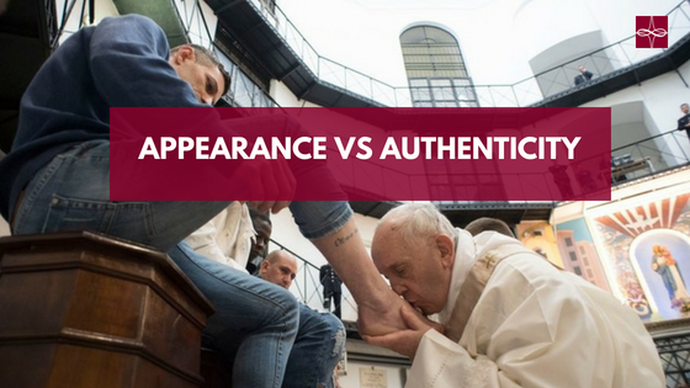

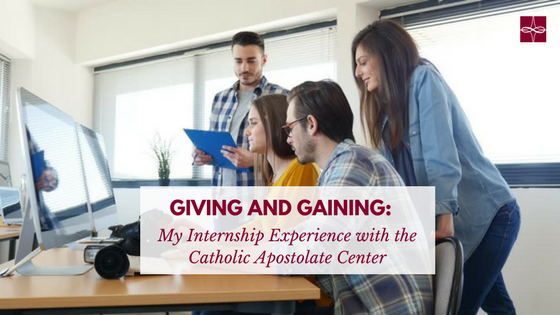
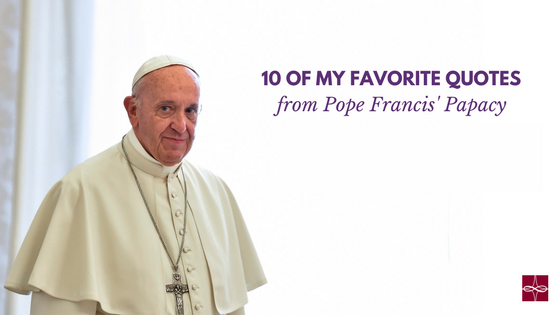



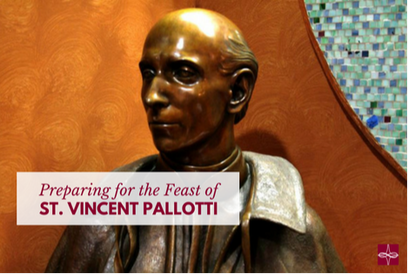
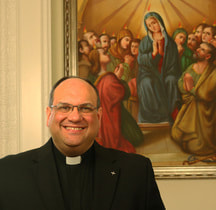






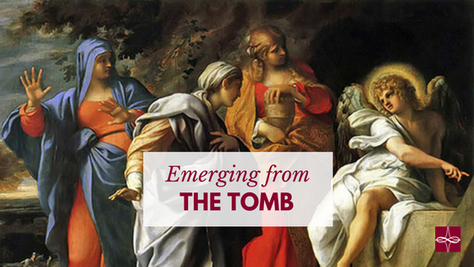


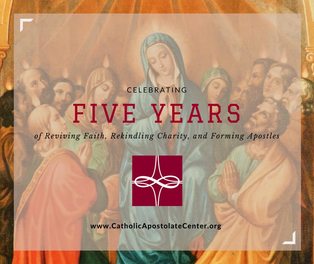
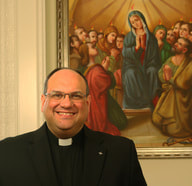
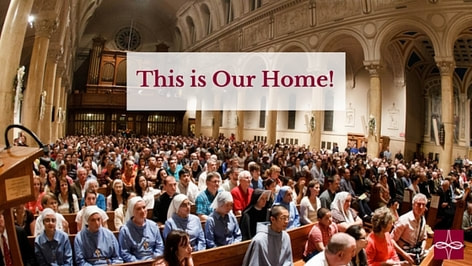

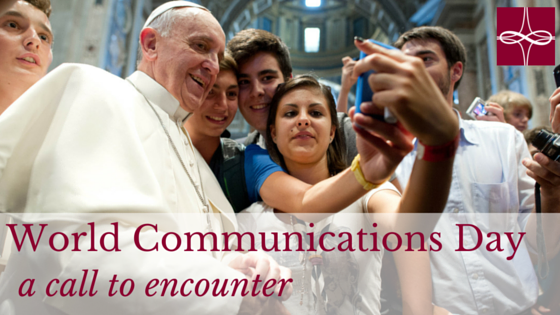

 RSS Feed
RSS Feed